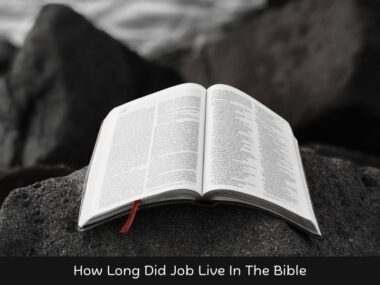Job’s story is punctuated abruptly, inviting readers into the depths of human suffering and divine sovereignty. At the heart of this ancient tale lies a central question: Why did Job lose everything in the Bible, despite being righteous? Job’s story forces us to reevaluate assumptions about justice, reward, and the reasons behind suffering. Unlike many biblical figures whose downfalls are attributed to sin, Job is described as “blameless and upright,” a man who “feared God and shunned evil” (Job 1:1). This distinction is crucial. Job’s trials were not punishments, but rather part of a larger spiritual reality—one that challenges simplistic interpretations of divine justice.
Understanding Job’s trials involves exploring the interaction between God and Satan, the nature of Job’s character, and how his losses were not rooted in wrongdoing but in divine purpose. Job’s story remains a theological cornerstone for exploring suffering.
The Story of Job
The Book of Job opens with a glimpse into Job’s prosperous life. He is a man of great wealth, with a large family and vast possessions. Job is admired for his integrity and piety, offering sacrifices regularly to cover any possible sins his children might commit. He is the embodiment of moral and social excellence in his time. However, the tone of the book shifts dramatically when the narrative moves into the heavenly realm.
In a divine council scene, Satan (literally “the accuser”) challenges Job’s integrity, claiming that Job is faithful only because of his prosperity. God permits Satan to test Job, but forbids him from harming Job himself. What unfolds is a devastating series of events that strip Job of his wealth, his children, and eventually his health.
The story of Job is more than a biography of a man who lost everything. It is a theological drama that explores human suffering, divine justice, and the complexity of faith when everything is stripped away.
Job’s Prosperity and Initial Trials
Job’s initial blessings are a picture of success: he owns thousands of livestock, has many servants, and is regarded as “the greatest man among all the people of the East” (Job 1:3). His large family gathers frequently in joyful feasts, and Job, acting as their spiritual priest, offers sacrifices to God on their behalf.
Then, without warning, Job’s world unravels. A series of messengers arrive, each with devastating news. In quick succession, Job learns that his oxen and donkeys were stolen, his sheep consumed by fire from heaven, his camels raided, and worst of all, his children killed in a windstorm. The events are not just tragic—they are symbolic of a total collapse. Every element of his prosperity is touched: economic, familial, and emotional.
Yet Job’s response is stunning. He tears his robe and shaves his head—a sign of mourning—but he falls to the ground in worship, declaring, “The Lord gave and the Lord has taken away; blessed be the name of the Lord” (Job 1:21).
The Role of Satan in Job’s Suffering
A key to understanding why Job lost everything in the Bible lies in the conversation between God and Satan. Satan contends that Job’s righteousness is superficial, rooted in the blessings he enjoys rather than genuine devotion. He argues that if Job’s comforts were removed, his faith would crumble.
God does not refute Satan’s claim with words; instead, He permits a test, knowing Job’s faith will endure. This cosmic wager sets the stage for Job’s suffering—not as a result of sin, but as a demonstration of genuine righteousness under pressure.
Satan is the immediate agent of Job’s suffering, orchestrating natural disasters and human attacks. However, even in allowing Satan to act, God maintains sovereign control. Satan can go only as far as God permits. This interaction reveals that suffering may originate from spiritual realms beyond our understanding, and that not all affliction is punishment—it can be part of a divine narrative of proving and refining faith.
Job’s Response to His Losses
Job’s initial reaction to his catastrophic losses is reverent and composed. Instead of lashing out, he falls to the ground and worships. His famous declaration, “Shall we accept good from God, and not trouble?” (Job 2:10), reflects profound spiritual maturity. Job does not understand why these things are happening, but he chooses to trust God’s sovereignty.
However, as time progresses and the emotional toll deepens, Job begins to express his anguish. In poetic laments, he curses the day of his birth and longs for death. His grief becomes raw and unfiltered. Yet even in his despair, he never curses God.
Job’s response illustrates a critical biblical truth: faith does not preclude lament. His honesty with God, his cries of pain, and his refusal to falsely accuse himself or turn against God reflect a real, authentic faith. Job demonstrates that it’s possible to question, grieve, and still believe.
Key Themes in the Book of Job
The Book of Job addresses some of the deepest theological and philosophical questions in human existence. Among the key themes are:
- The mystery of suffering – Job’s ordeal challenges the idea that suffering is always a result of personal sin.
- Divine sovereignty – God’s control and authority over all things, including Satan.
- Faith under fire – Job remains faithful despite intense pressure to curse God.
- The limits of human understanding – Job and his friends struggle to interpret divine action using flawed logic.
- Restoration and hope – Though Job’s suffering is profound, it is not the end of his story.
These themes make the Book of Job a timeless text, relevant across cultures and eras. They answer not only why Job lost everything in the Bible, but also what we can learn when we face our own trials.
Suffering and Its Purpose
One of the most difficult aspects of Job’s story is understanding the purpose behind his suffering. Unlike punishment, which results from wrongdoing, Job’s suffering was not corrective but revelatory. It served a divine purpose: to demonstrate that genuine faith is not dependent on blessing.
Suffering, in the biblical context, can purify, test, and reveal character. For Job, it stripped away every external comfort, leaving only his relationship with God. This kind of suffering reveals the depth and authenticity of a person’s trust in God.
The purpose of suffering is not always immediately clear, and often it remains a mystery. However, Job’s story shows that suffering can elevate the spiritual life, bringing believers into deeper trust, humility, and awareness of divine reality. This reframes the question from “Why is this happening to me?” to “What is God showing me through this?”
Faith Amidst Trials
Faith in times of blessing is one thing; faith in the furnace of affliction is another. Job’s experience is a model of faith amidst trials. When stripped of wealth, family, and health, Job could have turned away from God. Instead, he clung to his faith, even as he wrestled with doubt and despair.
Job’s declarations throughout the book are marked by a powerful mix of sorrow and trust. One of the most iconic is, “Though he slay me, yet will I hope in him” (Job 13:15). This statement captures the heart of Job’s faith—not dependent on outcomes, but rooted in who God is.
His faith does not mean he never questions or feels pain. Rather, it shows resilience and trust when answers are lacking. For modern readers, Job offers a blueprint for enduring suffering with spiritual integrity, illustrating how trust in God sustains the soul when circumstances collapse.
Questioning Divine Justice
Job’s central struggle is not just with his suffering, but with the apparent injustice of it. As the book unfolds, Job begins to question the fairness of his plight. He asks why the wicked prosper while the righteous suffer, and he calls out to God for an explanation.
Job’s questions are not rooted in rebellion but in confusion. He believes in a just God, but his reality contradicts that belief. This tension drives Job to demand an audience with God—to plead his case and receive understanding.
The Bible never condemns Job for these questions. Instead, God honours Job’s honesty and ultimately responds—not with answers, but with a revelation of His majesty and wisdom. Job’s questioning teaches us that it’s not wrong to ask God why, as long as we continue to seek Him in humility and reverence.
The Complexity of Grief
Job’s grief is profound, layered, and multifaceted. He experiences the loss of children, wealth, social standing, and health—all at once. His pain is emotional, physical, and spiritual. The poetic sections of Job reflect the complexity of his mourning: rage, despair, confusion, numbness, and even suicidal thoughts.
What makes Job’s grief even more intense is the spiritual confusion surrounding it. He is not just mourning loss; he is wrestling with a perceived abandonment by God. Yet even in this, Job never curses God.
Grief in Job is not linear or tidy. It comes in waves, it contradicts itself, and it stretches Job’s spiritual framework. In this, Job gives voice to every sufferer who has asked, “Where is God in this?” His story validates grief as a legitimate, human response to suffering and invites readers into a deeper empathy with those who mourn.
Lessons from Job’s Experience
Job’s story is not just a narrative of loss, but a reservoir of wisdom. One of the most powerful lessons is that suffering is not always a direct result of sin. Job’s upright life challenges the simplistic retribution model many of his contemporaries—and even some people today—embrace. His trials also illustrate the reality that faith must be tested to be proven genuine.
Another lesson from Job’s experience is the importance of authenticity in suffering. Job doesn’t pretend to be okay. He laments, questions, and even accuses—but he does so honestly and with reverence. This openness models how believers can approach God in times of anguish.
Moreover, Job’s experience teaches us that silence and presence often speak louder than words. His friends initially comforted him by simply sitting with him in silence. That moment, before their critiques, reminds us that empathy can be healing. Job’s life is a guide for both sufferers and supporters alike.
Suffering is Not Always a Punishment
A central theme in the Book of Job is the dismantling of the assumption that suffering equals divine punishment. Job’s story begins with a clear statement of his righteousness. His suffering is permitted not because he has sinned, but because he is blameless and strong enough to endure the test.
This challenges a transactional view of God where good behavior guarantees reward and sin ensures suffering. Job’s experience reveals a more complex and nuanced divine economy. Sometimes, the most faithful individuals face the harshest trials, not as punishment, but as a platform for greater spiritual insight and demonstration of integrity.
This theme is crucial for modern readers who may believe that hardships signify divine displeasure. The Book of Job insists that this is not always the case. Job lost everything, not because he failed, but because his faith was strong enough to endure the weight of such loss. That truth continues to reshape how we view suffering today.
Compassion and Support during Grief
When Job was at his lowest, his friends came to him. For seven days, they sat in silence, mourning with him. This is one of the most powerful moments in the entire book—a picture of true compassion and presence. It’s only after they begin speaking that their help falters.
The friends’ speeches are filled with assumptions and accusations, even as they try to explain why Job is suffering. Their error wasn’t that they spoke, but what they said. Instead of offering comfort, they tried to correct and rebuke Job, insisting his suffering must be the result of sin.
This aspect of the story highlights how crucial empathy and compassionate presence are during someone’s grief. Job’s experience warns against trying to rationalize or “fix” others’ pain too quickly. Sometimes, the most Christlike act is simply to sit, mourn, and offer no answers. Job’s friends teach us how easy it is to wound someone with theology when empathy is absent.
Human Resilience Through Faith
The Book of Job illustrates that faith can coexist with anguish, doubt, and despair. Job shows us that human beings can survive unspeakable pain—not by ignoring it, but by wrestling through it with God. Job’s resilience wasn’t rooted in denial or stoicism but in honest faith.
Even when everything was taken from him, Job did not abandon his belief in God. He questioned. He lamented. But he never renounced his Creator. This is the essence of spiritual resilience: maintaining a relationship with God even when His actions are beyond our understanding.
What’s more, Job’s experience reveals that resilience isn’t just about personal strength—it’s about grace. Job didn’t recover because he “powered through.” He endured because God sustained him. This redefines resilience, not as a human achievement, but as divine preservation. Faith helps believers endure trials that seem humanly impossible, and Job is living proof of that spiritual truth.
Rebuilding Life After Loss
After Job’s long ordeal, the narrative transitions to restoration. God blesses Job with double what he had before—more livestock, more children, and more years. While this conclusion is often seen as a happy ending, it’s important not to reduce it to a simple reward for endurance.
Job’s restoration is deeply symbolic. It shows that God can bring beauty from ashes, but it doesn’t erase the pain Job endured. The scars remain, even in restoration. Job’s experience is a testimony that rebuilding after loss is possible, but it comes with a changed perspective, deeper humility, and greater wisdom.
In real life, restoration may not look like a doubling of material goods. It may be peace, healing, or renewed purpose. Job teaches us that life after loss is not only possible—it can be meaningful. His journey encourages those in the ashes to believe that they, too, can rebuild, though it may look different than before.
The Role of Friends and Advisors
Job’s friends—Eliphaz, Bildad, and Zophar—are both helpful and harmful. Initially, they show up as true companions. Their silence speaks volumes. But when they begin to speak, their advice quickly becomes accusatory. They suggest that Job must have sinned, echoing a theology of retribution that dominates the ancient world.
Their words are filled with half-truths. Yes, sin can lead to suffering, but not all suffering is a result of sin. Their failure lies in assuming they fully understand God’s ways and Job’s situation. They prioritize doctrine over empathy, and in doing so, they wound their friend.
This teaches us a vital lesson about spiritual counsel: right theology delivered without compassion can do harm. The role of friends and advisors should be rooted in humility, love, and listening. Job’s experience is a cautionary tale for anyone quick to explain another’s pain. Sometimes, the best response is presence, not persuasion.
Eliphaz, Bildad, and Zophar’s Perspectives
Each of Job’s three main friends represents a different approach to suffering:
-
Eliphaz appeals to personal experience and mystical visions, suggesting that Job must have erred.
-
Bildad relies on tradition and authority, insisting that the wicked are always punished, and the righteous prosper.
-
Zophar is the most harsh and legalistic, accusing Job of receiving less than he deserves.
Their arguments share a common flaw: they all assume Job’s suffering must be deserved. They cannot conceive of innocent suffering. Their perspectives are rooted in a moral system that views God as a transactional deity.
Their inability to grasp the spiritual dimensions of Job’s trial blinds them to the truth. In trying to defend God, they misrepresent Him. The Bible later affirms this, as God rebukes them and praises Job for speaking rightly. This passage underlines the danger of oversimplifying divine action and the importance of humility in spiritual counsel.
Elihu’s Challenge to Job
Elihu, a younger man who speaks after the three friends, brings a different tone to the conversation. Unlike the others, Elihu doesn’t accuse Job of specific sins. Instead, he critiques Job for justifying himself rather than God. He suggests that suffering can be instructive—a form of divine communication.
Elihu’s speeches prepare the way for God’s intervention. While his words are not rebuked by God like those of the other friends, they are also not affirmed. Elihu’s role is transitional—he introduces the idea that suffering may be about more than punishment and can reveal God’s purposes.
Elihu also emphasizes the greatness and justice of God, which leads into God’s own speeches. While he may not provide perfect answers, Elihu shifts the tone from accusation to contemplation. His role in the narrative is a reminder that even youthful voices, when rooted in reverence, can offer valuable insights—though they still fall short of divine wisdom.
God’s Final Response
When God finally speaks, He does not offer direct answers to Job’s questions. Instead, He poses a series of rhetorical questions about the creation and governance of the universe. These questions highlight Job’s limited understanding and emphasize God’s sovereignty and wisdom.
God’s speeches (Job 38–41) shift the focus from “why” to “who.” Rather than explaining why Job lost everything, God reveals His majesty and control over all things. This is not a dismissal of Job’s pain, but a redirection of his focus.
Job responds with humility and repentance, acknowledging that he spoke of things he did not understand. Interestingly, God commends Job for speaking rightly about Him, unlike the friends. This shows that questioning God is not the issue—misrepresenting Him is.
God’s final response reveals that His ways are higher than ours and that trust is more important than understanding. Job’s suffering remains largely unexplained, but his faith is vindicated, and God’s justice is affirmed.
Job’s Restoration and Legacy
After God’s intervention, Job is restored—both spiritually and materially. He prays for his friends, and God blesses him with twice as much as he had before. He is given new children and lives another 140 years, seeing multiple generations.
But Job’s legacy is more than his restored wealth. He becomes a symbol of faithful endurance. His story is referenced throughout Scripture and theology as an example of trusting God amidst suffering. Even in the New Testament, James writes, “You have heard of Job’s perseverance and have seen what the Lord finally brought about” (James 5:11).
Job’s restoration is not just a happy ending—it’s a theological affirmation that God sees, knows, and rewards faithfulness. It also reassures believers that even if suffering is prolonged and inexplicable, it is not permanent. Job’s legacy invites readers into deeper trust and encourages us to believe in restoration, even if it looks different than expected.
Job’s Relationship with God Post-Trials
After Job’s restoration, his relationship with God takes on a deeper, more intimate tone. In the earlier parts of the narrative, Job speaks about God from a place of theological knowledge and righteousness. But after God confronts him directly, Job’s understanding shifts. He declares, “My ears had heard of you but now my eyes have seen you” (Job 42:5).
This profound statement suggests a transition from knowledge about God to personal experience with God. Job’s ordeal forged a relationship that went beyond ritual obedience—it became a connection built on tested faith, humility, and awe. Job no longer clung to assumptions or demanded answers; instead, he rested in trust and reverence.
Post-trials, Job’s relationship with God exemplifies a deeper form of worship. It acknowledges mystery, accepts divine sovereignty, and cherishes God’s presence more than His gifts. In essence, Job found something greater than restoration—he found intimacy with the Divine.
Restoration of Wealth and Family
Job’s restoration includes not only spiritual renewal but also tangible blessings. God restored Job’s fortunes, giving him twice as much as he had before. His livestock, family, and social standing were all returned and even increased. He had seven sons and three daughters, and his daughters were described as the most beautiful in the land—a detail highlighting not just physical beauty but perhaps symbolic of full restoration and honor.
Importantly, Job names his daughters, something rare in biblical genealogies, suggesting a new perspective and perhaps deeper appreciation for life and legacy. This may imply that Job, through suffering, developed a more inclusive and compassionate view of his family and community.
The restoration isn’t merely a “reward” for good behavior but an affirmation that God remains involved and generous even after intense suffering. It is a declaration that suffering is not the end of the story. Job lost everything in the Bible, but in God’s timing and wisdom, he also gained everything back—and more.
Long-term Impact of Job’s Story
The story of Job has resonated through millennia, influencing theology, philosophy, literature, and even psychology. Its impact lies in its refusal to offer easy answers. It holds space for grief, doubt, and lament while affirming God’s sovereignty and justice. Few biblical stories are as raw, complex, and enduring.
In religious traditions, Job is often cited as a paragon of patience and perseverance. In philosophy, especially in existentialism, Job represents the human confrontation with an often-absurd or incomprehensible world. In literature, from Dostoevsky to Kafka, echoes of Job’s anguish and questioning spirit recur.
Even in modern times, Job’s story provides comfort and confrontation. It comforts those who suffer innocently and confronts those who try to explain pain too easily. Job’s long-term impact lies in its universality. Every generation faces loss, and every generation must wrestle with its meaning.
Insights into Divine Sovereignty
One of the most profound themes in the Book of Job is the sovereignty of God. Job’s trials, orchestrated under divine permission, reveal a universe governed not by human logic but divine wisdom. God’s speeches in chapters 38–41 reinforce this sovereignty. Through a series of questions about creation, weather, and wild creatures, God reminds Job—and us—that His understanding far surpasses ours.
God’s sovereignty doesn’t make Him distant or uncaring. Rather, it places Him above human reasoning and timing. While this can be uncomfortable—especially when we suffer—it is also reassuring. It means that even when life seems chaotic, it is not out of control.
In the end, Job acknowledges this sovereignty with humility. He doesn’t get answers, but he gets God—and that is enough. The story of Job teaches that divine sovereignty is not always about explanation but about trust in God’s good and wise purposes.
Understanding God’s Role in Human Suffering
The Book of Job challenges simplistic views about God’s role in suffering. Rather than being the cause of Job’s pain, God permits Satan to test Job, within set boundaries. This distinction is crucial. It portrays God not as the author of evil but as one who allows suffering for reasons that serve greater spiritual purposes.
Job’s suffering is not divine punishment, but divine permission. That shifts our understanding from blame to purpose. God’s role in human suffering, as revealed in Job, is that of a sovereign overseer—One who sometimes allows pain to deepen our faith, refine our character, or reveal spiritual truths we couldn’t otherwise grasp.
This doesn’t make suffering easy, but it gives it meaning. It reminds us that while we may not always see the “why,” we can trust the “Who.” The story of Job, in its rawness and restoration, affirms that God’s silence is not absence—and His purpose is always redemptive.
The Mystery of Divine Wisdom
Throughout the book, Job and his friends attempt to explain suffering through human logic. But when God speaks, He dismantles their arguments not by giving clearer reasoning, but by revealing the vastness of His wisdom. Divine wisdom, as portrayed in Job, is not something humans can fully grasp.
This is one of the most humbling aspects of the text. It invites us into reverence, not reasoning. Job’s story reminds us that wisdom belongs to God, and sometimes trust must replace comprehension.
We may never know why Job lost everything in the Bible, at least not in a satisfying or formulaic way. But we are invited to rest in the mystery of a wise and loving God. Divine wisdom often means letting go of the need to control or understand and embracing faith in a God who sees beyond our vision.
Modern Interpretations of Job’s Trials
In contemporary theology and spirituality, Job’s story has been reinterpreted through various lenses—psychological, existential, pastoral, and even sociological. Some see Job as a symbol of the human condition, grappling with a universe that doesn’t always seem fair. Others find in Job a model for lament and emotional authenticity.
Pastoral care often turns to Job when comforting the grieving. His unfiltered honesty gives permission for believers to feel deeply and speak freely before God. Mental health advocates also find resonance in Job’s emotional range—his despair, confusion, and eventual peace mirror the psychological process of grief and recovery.
From a social justice angle, Job’s story has been read as a critique of systems that blame victims. It challenges narratives that the suffering are always responsible for their plight. These interpretations highlight how Job’s story continues to speak powerfully into modern experiences of loss and faith.
Relevance in Contemporary Contexts
In an age marked by suffering—whether through global pandemics, wars, personal loss, or systemic injustice—Job’s story remains profoundly relevant. His journey addresses the timeless question: “Why do good people suffer?” It refuses easy answers and instead invites readers into a complex dialogue with faith and doubt.
Job’s honesty is especially important today, in a world where people often feel pressure to “stay strong” or “keep the faith” without expressing real emotions. Job shows that questioning God is not unfaithful—it can be an act of faith.
His story also reassures us that suffering is not the end of the narrative. Restoration, whether material or spiritual, is possible. In contemporary faith settings, Job reminds believers that endurance, lament, and deep trust can coexist—and that God honors them all.
Job as a Symbol of Human Endurance
Over the centuries, Job has become a symbol of patience and perseverance. His name is often invoked when someone goes through a long, painful ordeal. But what makes Job a symbol of endurance isn’t just his ability to withstand suffering—it’s his refusal to give up on his relationship with God.
True endurance, as demonstrated by Job, includes wrestling, lamenting, and even complaining. But it also includes holding on to hope, refusing to curse God, and continuing to seek His face. Job teaches us that endurance doesn’t mean silence or suppression. It means showing up, again and again, even when we’re hurting.
In this way, Job stands not as a stoic figure, but as a deeply human one. He endured not by denying his pain, but by engaging it honestly. This makes his endurance not only remarkable but relatable—and deeply inspiring for anyone who suffers today.
Conclusion
The story of Job is not about a man who suffered because he was guilty, but about a man who suffered because he was faithful. It is a divine narrative that turns conventional thinking upside down. Job lost everything in the Bible—not as punishment, but as part of a cosmic demonstration of unwavering faith.
What makes Job’s story timeless is not just the pain he endured, but the way he endured it—with honesty, reverence, and persistence. His faith wasn’t perfect, but it was real. And in the end, that kind of faith is what God honored.
Job teaches us that suffering is not always explainable. That grief is complex. That faith can include questions. And that God is still good—even when He is silent. Job’s story offers a sacred space where human agony meets divine mystery—and in that space, the soul grows.
For anyone asking, “Why did Job lose everything in the Bible?”—the answer is layered, mysterious, and ultimately redemptive. His life calls us to trust in God’s goodness, even when we do not understand His ways.







